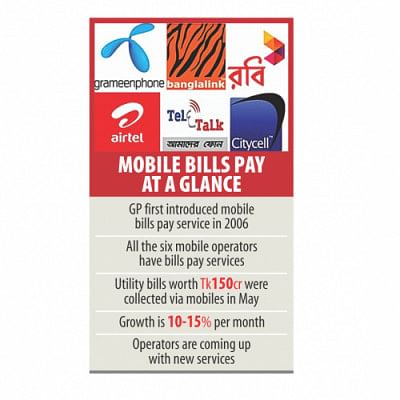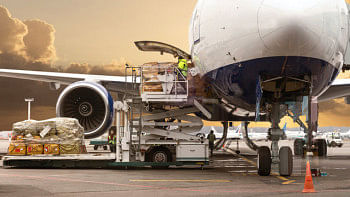Mobile bills pay on the rise

Bill payments through mobile phones have shot up in the last couple of months as operators increased their focus on such services.
People paid Tk 151.96 crore in utility bills through mobile phones in May, which was an 11.85 percent rise compared to April, according to central bank data. The amount was Tk 81.70 crore in February.
Mobile phone operators say the scope for expansion of mobile bill payment service is quite high in Bangladesh, as the industry is growing 10 percent every month.
"Proliferation of mobile phones and vast distribution channels make mobile payments a natural choice over other alternatives," said Sayed Talat Kamal, head of external communication at Grameenphone, which has such services.
The service has significant growth potential, particularly among the working class of the population and can play a big part in the formalisation of the informal economy, he said.
Mobile operators are currently offering customers the scope to pay mostly utility bills such as electricity, gas and water as well as insurance premiums.
Mobile services help customers avoid dealing with banks for utility payments completely.
The use of mobile payment is also increasing for education-related fees like tuition in schools and colleges as well as some examination fees.
The government is also promoting the use of the method by incorporating it into many of its fee collection procedures, especially through Teletalk.
Ekram Kabir, a vice president of Robi, said the company is planning to launch a new bill payment service soon to increase the customers' ease and help save their time and money.
“We are in the process of launching additional services, which are currently in the trial phase,” said Kabir.
Grameenphone was the first to launch mobile bill payment service for Power Development Board (PDB) in Chittagong in December 2006, and later went on to offer the same for Sylhet PDB, Dhaka Electric Supply Company (Desco) and Dhaka Power Distribution Company (DPDC).
Grameenphone now collects bills for Chittagong Wasa (Water Supply & Sewerage Authority) and also some gas distributing companies like Titas, Bakhrabad, Karnaphuli and Jalalabad.
The country's top mobile operator collects an average Tk 50 crore as bills every month, and the numbers are growing by more than 10 percent a month.
“Sometimes bills figures vary with the weather condition,” Kamal of Grameenphone said.
“If the regulator becomes more people-friendly, it will allow us to take our services to the masses in near future.” The third largest operator Robi recently got the rights to collect PDB bills for Rajshahi, Comilla, Mymensingh, Sylhet and Rangpur regions, and collected bills from around 3.70 lakh households there in just a month.
Customers can pay their bills from their own devices or can use operators' cash points, Robi officials said.
Banglalink launched its bill pay services in 2009, collecting bills for PDB, Desco, West Zone Power Distribution Company, Chittagong Wasa and two WiMax operators -- Qubee and Ollo.
Citycell, the oldest operator, collects Desco and DPDC bills and will soon offer bill payments for Dhaka Wasa.
State-owned operator Teletalk also has bill payment services for Bangladesh Rural Electrification Board.

 For all latest news, follow The Daily Star's Google News channel.
For all latest news, follow The Daily Star's Google News channel. 



Comments